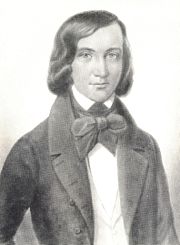
Nikolai Stankevich
Encyclopedia

Voronezh
Voronezh is a city in southwestern Russia, the administrative center of Voronezh Oblast. It is located on both sides of the Voronezh River, away from where it flows into the Don. It is an operating center of the Southeastern Railway , as well as the center of the Don Highway...
guberniya
Guberniya
A guberniya was a major administrative subdivision of the Russian Empire usually translated as government, governorate, or province. Such administrative division was preserved for sometime upon the collapse of the empire in 1917. A guberniya was ruled by a governor , a word borrowed from Latin ,...
- , Italy
Italy
Italy , officially the Italian Republic languages]] under the European Charter for Regional or Minority Languages. In each of these, Italy's official name is as follows:;;;;;;;;), is a unitary parliamentary republic in South-Central Europe. To the north it borders France, Switzerland, Austria and...
) was a Russia
Russia
Russia or , officially known as both Russia and the Russian Federation , is a country in northern Eurasia. It is a federal semi-presidential republic, comprising 83 federal subjects...
n public figure, philosopher, and poet.
In 1834, Nikolay Stankevich graduated from the Moscow State University
Moscow State University
Lomonosov Moscow State University , previously known as Lomonosov University or MSU , is the largest university in Russia. Founded in 1755, it also claims to be one of the oldest university in Russia and to have the tallest educational building in the world. Its current rector is Viktor Sadovnichiy...
, where he was influenced by Professor Mikhail Kachenovsky and followers of the so-called "skeptical school" in historiography
Historiography
Historiography refers either to the study of the history and methodology of history as a discipline, or to a body of historical work on a specialized topic...
. By late 1831, Stankevich had organized a literary and philosophical society called the Circle of Stankevich. He had been under police surveillance since 1833 due to his connections with a group of oppositionary university students led by Ya.I.Kostenetsky. In 1837, Nikolay Stankevich had to travel abroad due to his tuberculosis
Tuberculosis
Tuberculosis, MTB, or TB is a common, and in many cases lethal, infectious disease caused by various strains of mycobacteria, usually Mycobacterium tuberculosis. Tuberculosis usually attacks the lungs but can also affect other parts of the body...
.
Stankevich's literary and esthetical views, most of which mirrored the ideas of a Russian historian Nikolai Nadezhdin
Nikolai Nadezhdin
Nikolai Ivanovich Nadezhdin was a Russian literary critic and Russia's first ethnographer.Born in the Zaraisk District of Ryazan guberniya, Nadezhdin graduated from Ryazan Seminary in 1815 and Moscow Religious Academy in 1824...
, presupposed the humanistic enlightenment
Age of Enlightenment
The Age of Enlightenment was an elite cultural movement of intellectuals in 18th century Europe that sought to mobilize the power of reason in order to reform society and advance knowledge. It promoted intellectual interchange and opposed intolerance and abuses in church and state...
as the main task of the Russian intelligentsia
Intelligentsia
The intelligentsia is a social class of people engaged in complex, mental and creative labor directed to the development and dissemination of culture, encompassing intellectuals and social groups close to them...
. Stankevich is known to have considerably influenced some of the Russian and Muscovite
Moscow
Moscow is the capital, the most populous city, and the most populous federal subject of Russia. The city is a major political, economic, cultural, scientific, religious, financial, educational, and transportation centre of Russia and the continent...
intelligentsia in particular, including Vissarion Belinsky
Vissarion Belinsky
Vissarion Grigoryevich Belinsky was a Russian literary critic of Westernizing tendency. He was an associate of Alexander Herzen, Mikhail Bakunin , and other critical intellectuals...
, Timofey Granovsky
Timofey Granovsky
Timofey Nikolayevich Granovsky was a founder of mediaeval studies in the Russian Empire.Granovsky was born in Oryol, Russia. He studied at the universities of Moscow and Berlin, where he was profoundly influenced by Hegelian ideas of Leopold von Ranke and Friedrich Karl von Savigny...
, Mikhail Bakunin
Mikhail Bakunin
Mikhail Alexandrovich Bakunin was a well-known Russian revolutionary and theorist of collectivist anarchism. He has also often been called the father of anarchist theory in general. Bakunin grew up near Moscow, where he moved to study philosophy and began to read the French Encyclopedists,...
, and Alexander Herzen
Alexander Herzen
Aleksandr Ivanovich Herzen was a Russian pro-Western writer and thinker known as the "father of Russian socialism", and one of the main fathers of agrarian populism...
. Among Stankevich's literary works (mostly poetic and not numerous), there are a few verses dedicated to Moscow
Moscow
Moscow is the capital, the most populous city, and the most populous federal subject of Russia. The city is a major political, economic, cultural, scientific, religious, financial, educational, and transportation centre of Russia and the continent...
and a historical tragedy called Vasili Shuisky.

